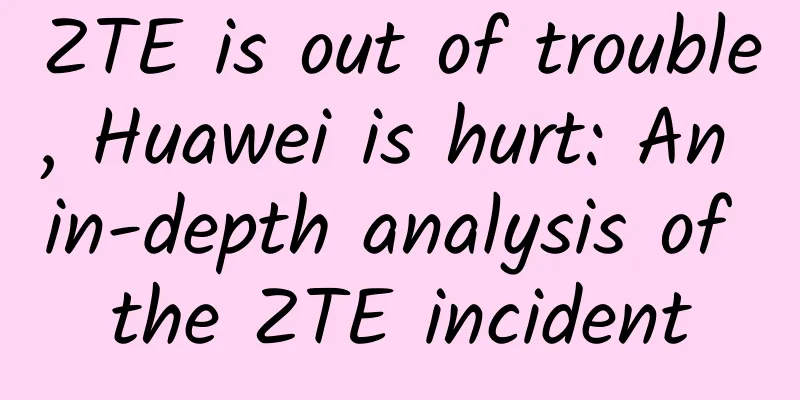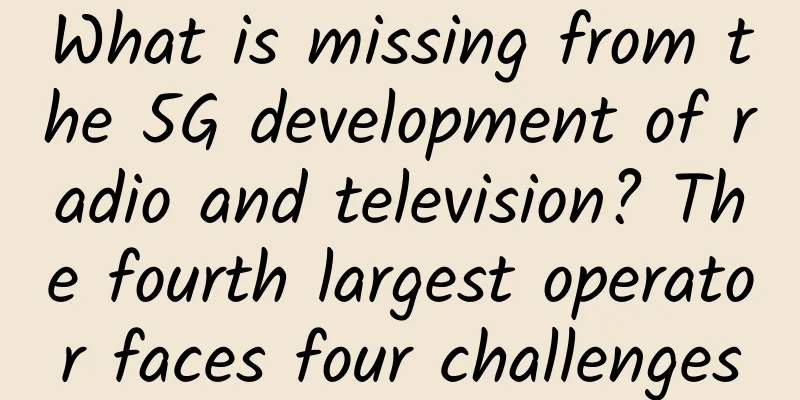ZTE is out of trouble, Huawei is hurt: An in-depth analysis of the ZTE incident

|
The official statement on June 7 that the U.S. Department of Commerce had reached an agreement with ZTE indicated that the ZTE incident had reached a phased result, but the final direction and outcome still need time to verify. Therefore, this article was written to summarize and predict the ZTE incident. The nature of the ZTE incident: The non-political positioning opened the door to a convenient solution to the ZTE incident I believe that the ZTE incident cannot be simply dismissed as politicized or a conspiracy theory, but rather the individual behavior of ZTE as a listed company needs to be reviewed to draw an objective conclusion. The root cause is that the series of sanctions imposed by the U.S. Department of Commerce against ZTE is, objectively speaking, a heavy price ZTE has paid for its violations of business norms, and what is exposed behind this is the painful lesson of the failure of corporate governance as a listed company.
On June 7, the official media Xinhuanet published an international review by Sheng Yuhong, a commentator of China National Radio International Online, which characterized it as "the ZTE incident is just an individual case of corporate violations, but the Chinese government, out of people-oriented considerations, invested a lot of resources in solemn representations to the United States, and finally bought back a way for ZTE to survive." I personally think this is basically the conclusion that meets the needs of the official. The U.S. Department of Commerce’s official statement also emphasized that the purpose of the relevant measures against ZTE is to correct ZTE’s violations, and at the same time set a precedent for ensuring compliance monitoring methods. Previously, U.S. officials including Commerce Secretary Ross and Treasury Secretary Mnuchin have repeatedly stated that the ZTE incident has nothing to do with the Sino-U.S. trade friction, and attributed it to law enforcement issues. Depoliticizing the ZTE incident is appropriate for both China and the United States to deal with more difficult trade frictions, which reflects the great wisdom of the top leaders of both sides. The pressure faced by China is the domestic public sentiment, while the US is facing various obstacles from the Democratic Party members in Congress in addition to the public sentiment. In fact, after the solution was introduced, some Democratic Party members continued to push Congress to introduce a bill to oppose the lifting of the ZTE ban on the grounds that ZTE threatens US security. Therefore, the common positioning of China and the United States on the depoliticization of the ZTE incident has opened the door for the resolution of the ZTE incident. Otherwise, if it is more deeply involved in the trade friction between the two countries, ZTE will be dragged down until it dies a more ugly death. In an internal letter sent to employees on June 7, ZTE Chairman Yin Yimin apologized to customers, shareholders and business partners, and said, "Based on the conclusions of internal and external investigations, the direct cause of this incident was the work negligence of a few cadres and employees, but its essence reflects problems in the company's compliance culture and management." Therefore, ZTE itself has made a final conclusion on the nature of the ZTE incident. ZTE's lifting of the ban: A 10-year denial order is more damaging than a $2.2 billion fine A $1 billion fine, a $400 million bond, a replacement of the board of directors and management within three months, 10 years of on-site monitoring by the compliance team, and a 10-year denial order that BIS can initiate at any time... According to U.S. Commerce Secretary Wilbur Ross, together with the $890 million fine already paid in 2016, the total fine ZTE faces will reach a record $2.29 billion, which is the largest fine ever issued by BIS. Since the US side has clearly required that BIS will only remove ZTE from the embargo list after ZTE first pays a $10 fine and a $400 million deposit, ZTE's top priority is to raise money to pay. ZTE's latest 2018 first quarter report shows that as of March 31, its book cash and cash equivalents balance was only RMB 23.6 billion, and its net cash flows from operating activities, investment activities, and financing activities in the first quarter were all negative. With no cash inflow due to the suspension of business operations, but continuous cash expenditures such as employee wages and bank interest, ZTE's financial pressure to pay fines and resume procurement can be imagined. Fortunately, ZTE has the support of the government. For example, during the more than 50 days when ZTE's business was suspended, the biggest task of its sales team was to collect accounts payable from customers, including the three major operators. According to people familiar with the matter, the three major operators all put the overall situation first and cooperated with ZTE's request. After paying the fine, the board of directors and management will be replaced at the same time as the resumption of production. According to a financial magazine, its chairman, CEO, CTO and some VPs will be replaced. Replacing the company's management and board of directors is not only to meet the requirements of the United States, but also to actively intervene in the new corporate governance of ZTE and its controlling shareholder ZTE, and to initiate a mechanism for accountability for the company's decision-making executives and relevant managers. The listed company ZTE Corporation currently has 14 board members. In addition to 5 external independent non-executive directors, the remaining 9 directors include one from Xi'an Microelectronics, a state-owned scientific research institution, four from Aerospace Guangyu, a wholly state-owned enterprise, and four from ZTE Weixiantong, a private enterprise holding shares on behalf of the founding team. Yin Yimin and Zhao Xianming from ZTE Weixiantong are executive directors and serve as chairman and president of ZTE Corporation respectively, and they bear the management responsibility on behalf of ZTE Weixiantong. Therefore, the replacement of the management and the board of directors for the purpose of accountability is mainly to remove the four directors who represent the interests of ZTE Weixiantong from the board of directors. Representatives of ZTE Weixiantong were removed from the board of directors of ZTE Corporation, and the corresponding equity change of its controlling shareholder ZTE New must be initiated. The total market value of ZTE Corporation before the suspension was about RMB 131.3 billion, and the equity held by ZTE New, which holds 30.34% of the shares, was worth about RMB 39.8 billion. Based on the 49% shareholding ratio of ZTE Weixiantong in ZTE New, the shareholding value was calculated to be RMB 19.5 billion, and equity transfer will be required. Judging from the fact that Tian Dongfang from Xi'an Microelectronics has been appointed as the Party Secretary of ZTE, it is more reasonable for state-owned enterprises such as Aerospace Electronics and Aerospace Science and Industry to acquire ZTE Weixiantong's equity in ZTE New. As a result, ZTE New, the controlling shareholder of ZTE, may become a state-owned enterprise with absolute control by a state-owned legal person. According to the agreement, the U.S. Department of Commerce will select and appoint a compliance coordination team to stay at ZTE for 10 years to monitor in real time whether ZTE's business practices comply with U.S. export control laws. According to media reports, ZTE will transform from the previous "state-owned holding, authorized operation" state-owned enterprise private model to a state-owned listed company supervised and operated by the U.S. government. The US government's power of supervision comes from the 10-year denial order suspended in the agreement. This is the most severe and damaging clause in the entire agreement for ZTE: first, the $2.2 billion fine was only a suspended sentence instead of the complete lifting of the denial order, which is obviously too heavy a punishment; second, the 10-year denial order continues to be a sword of Damocles hanging over ZTE's head. If it is not careful, it will be at risk of being sanctioned again, which will seriously threaten ZTE's business development. Analysis of ZTE's business trends: Huawei may be the biggest loser if ZTE is out of trouble For ZTE, survival is the most important thing, so after the huge fine and the change of management, ZTE is bound to face major changes. ZTE's business suspension for more than 50 days exposed huge business risks that not only threatened its own survival, but also had a serious impact on the normal business development of telecommunications service operators and government and enterprise customers in more than 160 countries and regions around the world that it serves. According to Dow Jones News, ZTE's base stations and other cellular equipment were idle in warehouses, causing major overseas customers to begin asking ZTE to pay penalties for unfinished work. According to people familiar with the matter, one of ZTE's largest European customers, Italian telecommunications company Wind Tre, has asked ZTE to pay 100 million euros in compensation for the suspension of network construction and maintenance work. Therefore, the rejection order, which has not been completely lifted but has continued to carry a 10-year suspended sentence, has become the biggest obstacle for ZTE's overseas market business. Against the backdrop of increasingly tense Sino-US trade situation, the overseas stock market, which accounts for more than 43% of ZTE's annual revenue, is likely to be reshuffled in the next few years. It can be expected that ZTE's business scope will be forced to shrink back to the domestic market, and its revenue scale will also decline significantly. The shrinking upstream market space will inevitably deal a heavy blow to ZTE's already huge corporate size. In order to strengthen its body and slim down, business restructuring may become an option that ZTE has no choice but to choose. From the 2017 financial report, we can see that among the three major business units of ZTE, namely, operator network, government business and consumer business, the competitiveness of the consumer business, which accounts for about 32% of the revenue, is relatively weak. Its mobile terminal market share ranks behind and its profitability is poor, with a gross profit margin of only 15.3%. Therefore, it is highly likely that the consumer business, which mainly focuses on mobile terminals, will be divested and sold, which is also the most urgent thing for ZTE to do in order to replenish the company's bleeding cash flow. For the enterprise business that accounts for less than 10% of the total share, the best destination may be to transfer it to ZTE's founding team during the equity transfer with ZTE Xianweitong. This will firstly reduce the equity consideration and save cash flow, and secondly, it will provide a platform and opportunity for ZTE's founders and original senior management team to make a comeback. After divesting its mobile phone and enterprise businesses, ZTE will focus on its operator network business, which accounts for more than 58% of its revenue. This is the focus of ZTE's R&D investment and also its core asset that it hopes to surpass its competitors by leveraging 5G industry opportunities. However, under the influence of the 10-year denial order, risk aversion will be an important consideration for customers in overseas developed markets when choosing suppliers. Therefore, ZTE's future 5G opportunities may only be able to focus on the domestic market. Even if there are overseas market opportunities, they will be limited to friendly countries along the Belt and Road that have good relations with China. In these markets, especially the domestic market, ZTE's biggest competitor is Huawei. After ZTE, which has become controlled by a state-owned enterprise and lost the opportunity to enter developed overseas markets, it will inevitably hope to gain a larger market share in the domestic and friendly markets to make up for its losses and maintain its survival. The competition between it and Huawei, which occupies the largest share of the domestic market, will inevitably intensify exponentially. Therefore, under a certain tacit understanding and balance, Huawei may be entrusted with the important task of winning more overseas markets by relying on its strong technological strength, and will be forced to make active concessions in the domestic market. As for why European manufacturers such as Ericsson and Nokia were not harmed, one reason is that their share of the domestic market is not large, and two, if Huawei wants to develop its business in the European market, the EU will also require reciprocal opening of the Chinese market. Therefore, after the crisis is resolved, ZTE will have to rely on the domestic market for survival and development. The relevant parties will certainly need Huawei to make concessions for the sake of the overall situation. The fierce competition between the two companies that has been formed in their development history may be eased. This can be regarded as a gain in the east when losing the stern in terms of improving corporate culture and industry ethos! Conclusion The above is my summary of the ZTE incident and my prediction of its direction. My conclusion may be too sharp to be accepted because it excludes the influence of national sentiment and local sentiment, but what I hope to do is to give a professional interpretation based on objective facts and rational thinking. I hope this article can live for a long time, and verify the trend of the situation one by one as time goes by. |
<<: The secrets of the mobile data war: "Unlimited" is conditional
>>: The secret to a fast-growing business: SD-WAN technology
Recommend
Pre-terminated trunk copper cable and method of using the same
High-density cabling products and standard modula...
Fault recovery and resource allocation in software-defined optical networks
Preface Traditional IP packet switching networks ...
JuHost Newly Launched Japan Tokyo 1Gbps Port High Bandwidth VPS 30% Off Starting from $3.49/month
JuHost has newly launched a data center in Tokyo,...
Sharktech cloud server 35% off annual payment starting at $33, 2G memory/40G hard drive/4TB traffic/multiple computer rooms available
Sharktech, also known as SK or Shark Data Center,...
Why is 50 ohms used in RF?
[[416676]] In RF circuits, RF devices with variou...
From "manufacturing" to "intelligent manufacturing", Qingdao Kute shares its successful experience
...
OluCloud: Los Angeles CN2 GIA/Hong Kong CN2 VPS 60% off, starting from $2.4/month
Oluyun is a foreign hosting service provider regi...
What are the main application scenarios of 5G?
5G networks offer greater bandwidth than previous...
5 ways to instantly improve WiFi signal and instantly get full WiFi signal, the physics you don’t know
During the May Day holiday, the WiFi at home beca...
One year later, let’s talk about Open RAN again
[[385310]] This article is reprinted from the WeC...
Don’t just focus on SD-WAN, pay attention to IPv6
The Internet of Things (IoT) is fundamentally cha...
The difference between single-mode fiber and multi-mode fiber and how to choose
1. What are single-mode and multi-mode optical fi...
Privileged Access Management: The Future of Cyber Resilience
Attacks against critical infrastructure and gover...
The 5G vision has not yet been fully realized, but 6G is coming?
◎ Science and Technology Daily reporter Liu Yan O...






![[Black Friday] Justhost has a 30% discount for a limited time, 22 data centers in Russia, the United States, Singapore, etc. are available](/upload/images/67cabce3ceaff.webp)


